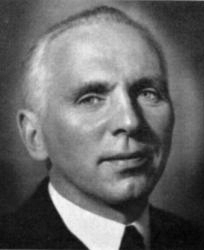Joakim Puhk
Joakim Puhk (born May 13 . Jul / 25. May 1888 greg. In Viljandi ; † 14. September 1942 in Kirov , Soviet Union ) was an Estonian entrepreneur and sports official.
Early years
Joakim Puhk was born as the third of seven children of the Estonian match manufacturer and sawmill owner Jaak Johann Puchk († 1917) and his wife Anna Luise († 1931). Joakim Puhk attended the business school in Riga until 1904 . In 1905 he took part in the Russian Revolution of 1905 as a social democrat . He was arrested in March 1906 for his work in Tartu and sentenced to three years imprisonment. Puhk was released again in 1909. In 1907 the family moved to Tallinn .
Business tycoon
In 1914 his father's company, founded in 1881, was renamed J. Puhk & Pojad ("J. Puhk & Sons"). Jaak Johann Puhk successfully ran a department store under this name. After his father's death in 1917, Joakim Puhk took over the business together with his brothers Eduard, Voldemar , Aleksander and Evald. In addition to his shares in his father's company, Joakim Puhk became a co-owner of the Estonian metal and machine factory Ilmarine . The company was later expanded to include the largest Estonian grain mill.
1917/18 Puhk was chairman of the Estonian food committee and 1918/19 deputy food minister of the Republic of Estonia. In 1918/19 the Puhk brothers partially financed the work of the Provisional Government . In the Paris suburb agreements in 1919 and in the negotiations for the Peace of Dorpat in 1920, Puhk was a trade delegate of the Estonian delegation. Puhk was a member of the Constituent Assembly ( Asutav Kogu ), which drafted the first Estonian constitution .
In 1924 Joakim Puhk became chairman of the Estonian Employers' Association, one year later chairman of the board of the Estonian Chamber of Commerce and Industry (until 1940). From 1932 to 1940 he was chairman of the Association of Estonian Wholesale Merchants ( Eesti Suurkaupmeeste Ühing ). In addition, Puhk was a board member of the insurance group Eesti Lloyd and a member of the central bank council of Eesti Pank .
In the interwar period , the Puhk brothers were among the most important and wealthy entrepreneurs in Estonia. With an annual income tax of 11,000 Estonian kroner, Joakim Puhk is considered the richest Estonian between 1918 and 1940. The Puhk brothers played a shady role in the purchase of the Estonian embassy buildings in Berlin and London and in the trade in Russian gold. They survived the economic crises of 1923/24 and the 1930s largely unscathed.
Puhk was Honorary Consul of Lithuania (1921-1927) and Finland (1927-1940). He also took part in the work of the League of Nations . In 1938 Puhk became a member of the Estonian State Council ( Riiginõukogu ).
In 1921 Joakim Puhk married the entrepreneur's daughter Anna Sinisoff. In 1927 the daughter Eva-Agne was born, in 1933 the daughter Anna Mirjam.
Sports official
In addition to his economic activity, Puhk was an important sports patron, who promoted and financially supported the sporting life in Estonia in the interwar period. After Friedrich Akel 1932 as the first Estonian member of the International Olympic Committee was excreted (IOC), which hit Estonian Olympic Committee in January 1936 (in connection with the Olympic Games in Berlin ) Puhk the new Estonian representative on the IOC before. Puhk was accepted as a member of the IOC on the eve of the 1936 Games and remained so until his death in 1942. In 1936 he received the German Olympic Medal of Honor for his commitment .
Arrest and execution
With the Soviet occupation of Estonia in 1940, the J. Puhk & Pojad company was expropriated by the occupation authorities. Joakim Puhk - like his brothers - was arrested on August 31, 1940 on the orders of the People's Commissariat for Internal Affairs of the Estonian SSR . He was first imprisoned in Patarei prison in Tallinn before he was taken to Kirov Oblast , in the interior of the Soviet Union, in June 1941 .
Joakim Puhk was sentenced to death by the NKVD on August 8, 1942 and shot in Kirov No. 1 prison the following month .
literature
- Vahtre, Sulev (Ed.): Eesti ajalugu elulugudes. 101 tsat eestlast. Tallinn 1997 ( ISBN 9985-66-081-1 )
Web links
- CV (English; PDF file; 390 kB)
- Biography and sports career (Estonian Olympic Committee)
- Memories of Anna Mirjam Kaber, née Puhk (English)
Remarks
- ↑ http://www.la84foundation.org/SportsLibrary/JOH/JOHv8n2/johv8n2n.pdf
- ↑ http://www.eestigiid.ee/?ItemID=306&PYear=aasta&Person=nimi&start=165
- ↑ The proposal was strongly influenced by the National Olympic Committees in Finland and Sweden supported
- ↑ http://www.eok.ee/est/olympialiikumine/olympialiikumine_eestis/joakim_puhk?sess_admin= ( page no longer available , search in web archives ) Info: The link was automatically marked as defective. Please check the link according to the instructions and then remove this notice.
| personal data | |
|---|---|
| SURNAME | Puhk, Joakim |
| ALTERNATIVE NAMES | Puhk, Joachim |
| BRIEF DESCRIPTION | Estonian entrepreneur and sports official |
| DATE OF BIRTH | May 25, 1888 |
| PLACE OF BIRTH | Viljandi |
| DATE OF DEATH | September 14, 1942 |
| Place of death | Kirov , Soviet Union |
